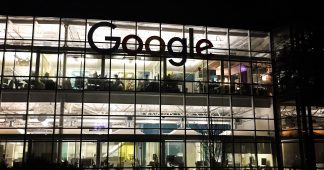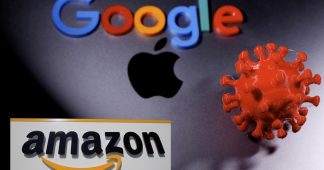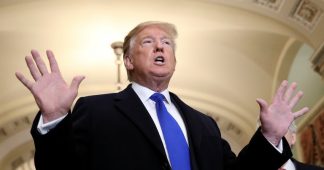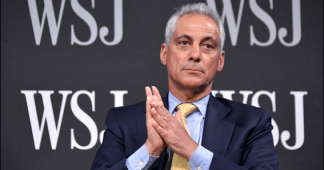Renata Hesse, who has worked for Google and Amazon, is the leading candidate to run the Justice Department’s antitrust division.
By David Dayen, Ryan Grim
J
A last-minute campaign by a coalition of groups working to check monopoly is being launched to stave off what they worry could be a series of calamitous antitrust appointments by President-elect Joe Biden. The move follows reports on Friday from The American Prospect and The Intercept, confirmed and expanded on Sunday by Reuters, that Biden is leaning toward two attorneys with deep experience advising monopoly platforms to head the antitrust division at the Department of Justice.
Renata Hesse, a former Justice Department official under President Barack Obama, worked alongside Sen. Ted Cruz defending Google a decade ago, helped shepherd through the Amazon/Whole Foods merger, and represented several pharmaceutical companies and other clients in antitrust cases. She is the leading contender for the assistant attorney general for antitrust position, multiple sources told the Prospect and The Intercept on Friday. Sources also said that Juan Arteaga, another Obama Justice Department veteran who defended JPMorgan Chase and several other financial firms in fraud cases and represented AT&T in its merger with Time Warner, was also being considered but was more likely to be appointed deputy assistant attorney general in the antitrust division. Reuters on Sunday reported that Hesse and Arteaga were the leading candidates for AAG.
The Big Tech ties have progressives particularly exercised by the possible Hesse pick, though Arteaga’s long track record of working on behalf of consolidation is also alarming. There are active anti-monopoly cases at the antitrust division against Google and Facebook, the biggest such cases in 20 years. Hesse’s work for Google would likely force her to recuse herself from the former. There is bipartisan support for reining in Big Tech and a blueprint for how to do it in an exhaustive report from the House Antitrust Subcommittee. Picking a Big Tech lawyer would open up Biden to criticism from the left and right, aside from the unusual circumstance of the top attorney in the division recusing herself from the most important case under her watch.
“Bringing in anybody from Big Tech to a leadership role in antitrust is a political, policy, and managerial disaster,” said Zephyr Teachout, author of “Break ’Em Up” and a frequent Big Tech critic, referring to Hesse. “We know how the revolving door works. The ideology of big companies shapes the ideology of government.”
As recently as a couple years ago, Hesse seemed to dismiss antitrust concerns from Google’s control of the online search market. “The reason why people use Google Search, generally, is because they like it better,” Hesse said at a Federal Trade Commission field hearing. “This is when I start to worry about, are we gonna punish someone because they did a great job?” She also said that it’s “really easy to switch” away from Google if users don’t like the product. Hesse noted at the hearing that Google was a former but not a current client of hers
The final decision on who will take the AAG position has not been made, but the current candidates for the top job and the deputy positions include a number of additional corporate attorneys, as well as at least one with progressive backing. Jonathan Kanter, a plaintiff’s lawyer who helped design the cases against Google and Facebook, remains in the mix for the AAG job. Gene Kimmelman is being considered for a deputy position, and while he brings consumer protection experience and has some progressive support, a recent paper of his suggesting that an entirely new agency is needed to tackle digital platforms has some reformers skeptical of his commitment to aggressive antitrust enforcement. Floating his name could be a way for the Biden team to make a show of progressive inclusion without changing the actual dynamic.
The elevation of Hesse and Arteaga suggests that Biden loyalist Terrell McSweeny may be disinclined to take the job. People close to the process have said that it has long been hers if she wanted it, but a recent family tragedy is weighing on the decision. If she passes, Biden is said to be willing to create a White House position for her that would coordinate antitrust policy across the FTC and Justice Department.
Hesse, Arteaga, and others short-listed for deputy positions immediately raised eyebrows among progressive groups. “American democracy is in crisis, and it is in some ways a result of social media corporations who have killed local newspapers and structured their business models to engage, radicalize, and addict users so they can monopolize ad markets,” reads a letter to Biden led by Public Citizen and the American Economic Liberties Project, and organized within a couple days. By Monday 40 groups had signed on. “We believe that appointing antitrust enforcers with no ties to dominant corporations in the industries they will be tasked with overseeing — particularly in regard to the technology sector — will help reestablish public trust in government at a critically important moment in our country’s history.”
Hesse has gone in and out of the antitrust division and corporate defense law firms since the 1990s. A stint at the Justice Department from 2002 to 2006 featured one notable action: advising the IRS in 2005 that it could restrict free tax filing services for taxpayers making above $50,000 per year. If private companies did so, they would be engaging in illegal price fixing. Because the IRS took the action, blessed by Hesse’s advice, it went through, ruining an effort by TaxAct to give free tax filing services to everyone. This allowed market leader Intuit (makers of TurboTax) to dominate and gouge consumers for tax preparation.
After the Justice Department service, Hesse spent five years practicing at Wilson Sonsini Goodrich & Rosati, Google’s go-to law firm. She did significant antitrust work for Google during this time, including defending the company against state attorney general investigations. Advocating for Google in a case in Texas in 2010, she teamed up with a lawyer from Morgan, Lewis & Bockius named Ted Cruz, accompanying him to numerous meetings with the Texas attorney general. Ultimately, Hesse and Cruz were successful, and no action was taken against the company.
Cruz is currently fighting to retain his law degree and bar license after contributing to the incitement of a riot at the U.S. Capitol, an event promoted on Big Tech platforms like Google’s YouTube. Hesse is on the verge of getting a promotion.
She went back to the Justice Department in 2012, overseeing the Comcast/NBCUniversal deal, which kicked off a trend of vertical combination in media of networks, movie studios, and cable distributors. She waved through Humana’s purchase of insurance provider Arcadian and the acquisition of Virgin America by Alaska Airlines, among other deals.
Hesse rose to become acting assistant attorney general for the antitrust division from July 2016 until the end of the Obama administration. In September 2016, at a time when the Obama administration was reckoning with economic consolidation on their watch, Hesse gave a speech that was lauded for its willingness to criticize traditional economics-based approaches to antitrust and its endorsement of “looking more broadly at the effects of business practices on competition.” That approach dovetails with the one anti-monopoly advocates are pushing.
Hesse argued that mergers between large competing firms that would result in significant market share should automatically be looked at skeptically, even if it couldn’t be proven that consumers would suffer through higher prices immediately. (Then-Vice President Biden’s office reportedly helped write the speech.)
The speech hit a nerve, as evidenced from the Heritage Foundation’s concern over sending the “wrong signals” to businesses. But notably absent in the speech was any reference to the big technology platforms, which at the time were dominating the conversation about the need for stronger antitrust enforcement. Within a few months, the Obama term was up, and Hesse was out of the Justice Department. And she more than made up for her heresies.
She became a partner and co-head of the antitrust group at Sullivan & Cromwell, a major corporate law firm, where she now works. The hiring announcement cited Hesse’s “deep and highly relevant government experience.” It almost immediately paid off. Later on, accepting the “Competition Group of the Year” award by Law360 in 2019, Hesse highlighted how the firm’s small teams were able to clear giant mergers, because “the quality of the resources is what really matters.”
Hesse was a lead adviser to Amazon on its $13.7 billion purchase of Whole Foods, which elevated the e-commerce giant into physical retail. She worked for drugmakers Merck, Novartis, and Amgen on various mergers. She advised Fiserv’s $22 billion acquisition of First Data, which created a near-monopoly in financial services technology solutions. She advised Praxair’s $80 billion merger with Linde, creating a market-leading industrial gas giant. She worked on the Harris/L3 Technologies defense contractor combination. She helped push through American Express’s purchase of online lender Kabbage.
These numerous involvements with major companies whose future deals would come under the purview of the Justice Department present a significant problem for Hesse, Teachout noted. Large swaths of the pharmaceutical, technology, and banking sectors would probably have to draw a recusal from the head of the department. “You would have Hesse recusing from the biggest ongoing antitrust case that key decisions have to be made on,” she said, citing Hesse’s work with Google. “It’s weird and awkward; it creates weird management questions. Who will be running the Google case then?”
Hesse’s involvement with Google is a family affair. Her husband, Joshua Soven, a partner at Wilson Sonsini Goodrich & Rosati, is currently working for Google. He’s also represented Grubhub, LinkedIn, Marriott, Tenet Healthcare, Hewlett-Packard, and BNSF Railway, and he was lead counsel for T-Mobile in its successful acquisition of Sprint. Soven, who worked in President George W. Bush’s antitrust division, is a regular donor to Republican candidates, including Sens. Josh Hawley, Mo.; Ron Johnson, Wisc.; Pat Toomey, Pa.; and Susan Collins of Maine. His antitrust work could also trigger Hesse’s recusal from various cases.
For her part, Hesse maxed out donations to Biden’s presidential campaign and has contributed over $27,000 to the Democratic National Committee since 2008. To reformers, relying so heavily on Obama alumni is setting the antitrust agenda up for failure. “If you put in Obama alumni, you have evidence that they’ve done a bad job before, and there’s a natural human nature to believe that your previous decisions were the right ones,” said Teachout. “Nobody out there thinks Obama’s administration was strong on antitrust. There’s no need to go back to a weak, ineffective regime.”
Monopoly opponents remain hopeful that Kanter could emerge from all the jockeying if the decision is elevated to the highest levels. Bruce Reed, a longtime Biden friend and ally, has long stood on the furthest-right end of the spectrum within Democratic politics, but the politics of monopoly scramble the conventional calculus, and Reed happens to be a longtime critic of Big Tech’s dominance.
Biden chief of staff Ron Klain has traditionally not been seen as a skeptic of Silicon Valley, but the politics on the issue have moved fast. Klain has spent parts of the past 15 years as general counsel for a venture capital shop called Revolution, founded by AOL chief executive Steve Case. He also has advised Higher Ground Labs, an investment firm focused on campaign tech backed by Reid Hoffman, cofounder of LinkedIn.
The staffing decisions take on added import now that Biden has chosen FTC Commissioner Rohit Chopra to head the Consumer Financial Protection Bureau. Consumer finance advocates cheered the selection of Chopra, known as an unapologetic ally of the little guy. But his exit from the FTC leaves a gaping hole that is wider than just his one vote, as Chopra’s depth of knowledge and political dexterity shifted the balance of power on the commission and allowed him to create unlikely coalitions against the power of Big Tech and other consolidated industries. Unless he is replaced by someone of similar stature, such as Columbia law professor Lina Khan, a leading anti-monopoly voice who co-authored the House Antitrust Subcommittee report and is being pushed by advocates of checking consolidation, tech titans will have an easier time before the commission. Chopra’s move from the FTC to the CFPB also underscores a major problem plaguing progressives in Washington: Even as the conversation gravitates toward their perspective, the bench is so thin from four decades of neoliberal hegemony that there aren’t enough bodies to execute that vision
In the absence of that progressive bench, several Obama-era colleagues could reunite at the Justice Department’s antitrust division, according to several sources. Arteaga (if he doesn’t get the AAG job), Sonia Pfaffenroth, and Kimmelman are among those likely to be placed in senior positions. No appointments have been made as of yet.
Arteaga, a partner at Crowell & Moring, served in the antitrust division from 2013 to 2017. At Crowell, he has defended JPMorgan Chase from charges that it manipulated benchmark interest rates known as LIBOR; Royal Bank of Scotland, UBS, and Deutsche Bank in litigation involving corruption in the mortgage-backed securities market; Morgan Stanley in a securities fraud case; a “global investment bank” in a separate mortgage-backed securities case; and Mastercard in antitrust litigation brought by American Express and Discover. Arteaga has also worked on numerous cases involving AT&T, a top Crowell client, including its acquisition of DirecTV and its purchase of Time Warner. He represented United Technologies in its acquisition of Rockwell Collins and defended private equity giant KKR against accusations that it purchased grocery chain Bruno’s and forced it into bankruptcy while extracting value.
Pfaffenroth has also gone back and forth between top corporate antitrust law firm Arnold & Porter and the Justice Department. Pfaffenroth’s clients in private practice have included Mallinckrodt Pharmaceuticals, Bayer, Koito Manufacturing, Fujikura Ltd., Snapfish, Unilever, Boston Scientific, mining company Bucyrus International, and more.
Kimmelman was chief counsel for the antitrust division in the Obama administration and has served in several Washington, D.C., think tanks and organizations like the New America Foundation, Consumers Union, the Consumer Federation of America, and Public Citizen. He was CEO of the telecom-focused Public Knowledge and is now a senior adviser there.
Public Knowledge takes a modest amount of money from Google, but Kimmelman is normally described as a critic of Big Tech. He recently co-wrote a paper for the Brookings Institution with former Federal Communications Commission chair Tom Wheeler that called for a separate agency focused on digital platforms to regulate large technology firms. This irked some reformers who believe that a new agency would only muddle already clear anti-monopoly cases against the platforms and would be subject to corporate capture.
Other tech critics have not forgiven Kimmelman for his role in the Justice Department suing book publishers early in the Obama administration for teaming up with Apple on a pricing system for e-books to defend themselves against Amazon’s market power. “Instead of suing Amazon for monopolizing the book market, Kimmelman chose to sue publishers for defending themselves against Jeff Bezos,” said Matt Stoller, author of “Goliath” and director of research at the American Economic Liberties Project. “That is an example of using antitrust law to help monopolists.”
Obama’s performance on antitrust and corporate power was savagely criticized last week in a comprehensive report from the American Economic Liberties Project, showing how economic concentration tightened across a host of industries in the Obama era and federal regulators did little to stop it. The report recommended that Biden move on from the failed philosophy of the past and choose aggressive reformers to crack down on monopolies. The names being floated oversaw several disastrous mergers in the Obama era, including American/US Airways, Anheuser-Busch InBev/SABMiller, and Comcast/NBCUniversal.
“An Obama restoration in antitrust is the worst possible outcome,” said Jeff Hauser of the Revolving Door Project, another Big Tech critic. “Hesse would represent Obama 2.0 on antitrust, which would give us ever-strengthened Big Tech platform monopolies and so much more.”
The title of the report, “The Courage to Learn,” was a nod toward the likelihood that at least some Obama alumni would wind up in positions of power, coupled with the demand that they learn from their previous mistakes. But combining a record of reticence to enforce antitrust laws with experience working on behalf of the very firms now being sued was a bit much, said Sarah Miller, executive director of AELP, which produced the report. “Especially at this moment, it’s critical to avoid appointments that have a track record of helping monopolies like Google and Amazon consolidate power,” she said. “Elevating aggressive state enforcers or experienced plaintiffs’ side attorneys will set the department up for success rather than looking backwards to those who oversaw a catastrophic era of lethargy.”
Published at theintercept.com











